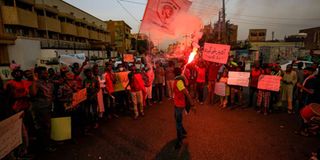Premium
Sudan 'regrets' tone of US travel advisory over Covid-19, civil unrest

What you need to know:
- In a standard advisory, the State Department called on US citizens to "reconsider travel to Sudan due to Covid-19... crime, terrorism, civil unrest, kidnapping and armed conflict".
- In contrast, Sudan's government this week welcomed remarks from US Secretary of State Mike Pompeo that he would like to delist Sudan as a state sponsor of terrorism.
Khartoum,
Sudan said Saturday it "regrets" the tone of the latest US State Department advisory against travel to the country, saying it does not take into account changes of the post-Bashir era.
"The ministry calls on its counterpart to show caution when warning its citizens to reconsider travel to Sudan," the foreign ministry said in a statement.
It stressed "the great change brought about by the glorious revolution of December 2018" that led to longtime leader Omar al-Bashir's ouster, saying Khartoum "regrets" the wording of Thursday's advisory.
The country was now one of "political stability, free demonstrations, and protection of human life and the rights of Sudanese citizens, with peace negotiations underway with armed struggle movements".
In a standard advisory, the State Department called on US citizens to "reconsider travel to Sudan due to Covid-19... crime, terrorism, civil unrest, kidnapping and armed conflict".
"Members of known terrorist groups continue to be in Sudan and could pose a threat," it said.
"Demonstrations can occur with no warning," although recent protests had been "peaceful with no police response".
TERROR LIST
In contrast, Sudan's government this week welcomed remarks from US Secretary of State Mike Pompeo that he would like to delist Sudan as a state sponsor of terrorism.
Pompeo has repeatedly indicated Washington hopes to remove the designation, which dents investment in Sudan, but disputes have arisen on compensation over the 1998 bombings of two US embassies in Africa.
Bashir had welcomed Al-Qaeda chief Osama bin Laden and Sudan was accused of aiding jihadists who blew up the embassies in Kenya and Tanzania, killing 224 people.
Sudan's new government has agreed to a compensation package but a dispute has arisen over higher payments to Americans than to Africans.





